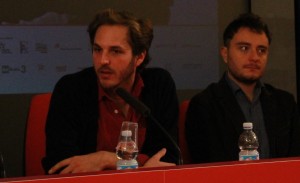Article by: Lorenzo Trombi
Translation by: Martina Taricco
Torino, November 23, 2015 – Lo Scambio, directed by Salvo Cuccia, is one of the four Italian movies which run in the main section of the 33rd Torino Film Festival.
The story is inspired by real events. The director wrote it after several meetings with Magistrate Alfonso Sabella, where the two had the chance to touch the subject of a mafia homicide in which three young boys were killed: two of them were, without any doubt, not tied to organized crime.
The first estranging element is that characters in this story do not have a name: this choice contributes to amplify the ambiguity of the plot. The whole sequence of events starts in media res with a series of crossfades of people walking in a normal city market. The music is deafening. Here, all of a sudden, two strangers appear on the scene and kill two young boys.
In the next scene the action moves on to a police station, where something does not completely persuade the audience. Although the badge of people who work in such place is shown many times, there are some elements, scattered all along the movie, which give to the public the feeling of not really being in a law seat. In a narrative climax, played on the edge of uncertainty and of the untold, is instilled the doubt that who serves the law might, actually, be a ruthless mafia boss. The proof of this comes shortly after, in a scene where a presumed chief of police, one of the protagonists, is shown, years before, while being questioned himself.
On a scenographical level, there is an interesting contrast between very austere house interiors and the exteriors of an extremely degraded Palermo. The interiors where a hypothetical Janus Bifrons moves, that is to say the chief of police who actually is a mafia boss, are rational and tied. It is however behind this formalism and this aseptic cure that a strong anguish feeling is hidden. The pitch is reached when the boss’ wife hangs herself as she can not live secluded in her own house, hunted by her demons.
Every character has its double; their psychologies are all shifty and cryptic: anyone could be anyone else. This choice made by the director is intended to focus the audience attention on the core of the events rather than on the personalities of the characters or on relational dynamics.
Everything in the movie is made essential; the story is apparently narrated in an impersonal way. The credo that is in force in this film is not siding with anyone.
These atmospheres enhance the feeling of indefiniteness and uncertainty in which a significant thematic crux is unraveled: what if the mafia has got the wrong person?
The chief of police questions a helpless surveyor who had the bad luck of being in the wrong place at the wrong time. The man is eventually killed, an eye-opening event which shows us how the mafia can sometimes get off track when deciding who has to be killed. By this stage of the film, as confirmed by the title, it seems very likely that there was a mistake and the man was mixed up with somebody else.
The several changes of the focus really strike the eye and add to the feeling of anxiety and oppression experienced by the characters in the film.
The decision to film a gunfight without actually showing it but presenting it to the audience in a fixed camera shot and through the gunshot sound is spot on.
Similarly, in a beating scene we don’t see people fighting but it is possible to understand what is happening thanks to the noise we hear and the shadows on the walls.
Cuccia’s notable work is structured as a moral story where all events are connected in a cause-effect relationship. He depicts a dry and cold story where everything is based on retaliation.


















